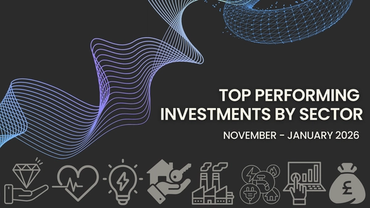Why blockchain ETFs are on the rise
1 Nov, 2022
When you hear the word 'blockchain', you might think of Bitcoin and other cryptocurrencies, which have been on a rocky journey in recent years - to say the least. But as the number of blockchain ETFs on the market grows, you might be wondering, what's the attraction? And is it worth getting involved?

First of all, what is a blockchain?
In case you're not familiar with blockchains, they're essentially decentralised, public ledgers which are digitally distributed. Or you can think of them as shared databases, with information recorded in blocks, which is chained together in chronological order and visible to the public. The aim of a blockchain is to record and distribute digital information, but crucially, not to edit it. They're also often referred to as DLT - distributed ledger technology.
Blockchain technology is most well-known for its role in the cryptocurrency world, where it's used to entirely digitally store and transfer data about ownership of assets. One of the biggest perks of blockchains is that once data is recorded, it's kept there forever and cannot be altered by anyone - at least, in theory. In the case of cryptocurrency, this means that all transactions are permanently recorded and anyone can view them at any time.
Having all records permanent, immutable, and viewable by anyone makes blockchains attractive as a means of storing data without the need for an overarching third party, such as a bank. This 'decentralisation' - not being reliant on a single authority or institution to control or monitor activity - is increasingly popular among the tech-savvy and has even been touted as a potential future of finance.
However, it's not all about crypto. While it's true that blockchain technology is the foundation of crypto asset ecosystems like Bitcoin, it also serves a much broader purpose. It has the potential to speed up data transfers to help business, systems and platforms become more efficient and transparent, reduce their operational costs, and increase their profit margins. Naturally, that creates an opportunity for investors.
What's happening with blockchain investments?
In the few years that they've been available, blockchain stocks and ETFs have endured the typical rise and fall that many fledgling investing trends often do. After a relatively quiet first couple of years, blockchain stocks soared during the pandemic recession, with thousands delving into cryptocurrency when traditional stocks tumbled. You're probably familiar with the many headlines about the growth of Bitcoin in that short space of time. In fact, Bitcoin rose more than 1,200% between March 2020 and November 2021.
However, as the global economy begins to settle back to "normality", attitudes towards crypto assets - and thus, to the blockchain technology which underpins them - have changed drastically. Regulators around the world have been grappling to lay down some rules on the largely-unregulated industry, where there is essentially no consumer protection for owners of crypto assets if their holdings are compromised - regardless of whose fault it is. And as the cost of living squeeze really starts to bite, people are less inclined to stick their money into an industry plagued by volatility and lack of regulation.
As money piles out of cryptocurrency, it has a knock-on effect for the blockchains that use them as a foundation. In September 2022 there were as much as $5.64bn in net outflows from Crypto ETFs and ETPs - many of which are invested in blockchain technology - across the preceding 12 months, according to ETFGI’s August 2022 ETF and ETP Crypto Industry Landscape Insights Report. You can read more of the facts and figures here.
Why are blockchain investments still popular?
However, despite the outflows we've seen in recent months, blockchain technology still has exciting potential and arguably wide-reaching implications for data recording worldwide. And in our increasingly tech-dependent society, many believe that the heyday of blockchain investments still lies ahead.
To this end, ETFGI’s July 2022 ETF and ETP Crypto Industry Landscape Insights Report highlighted that, as of July 2022, there were 164 crypto ETFs/ETPs listed around the world, with total assets of $8.35bn, from 32 providers listed on 18 exchanges in 14 countries. Beyond this, GlobalXETFs (one of the largest ETF providers in the world) reported that the global blockchain market was valued at nearly $5bn in 2021, with forecasts suggesting it could grow over 10x to more than $67bn by 2026.
Here are 3 key reasons why many believe in the potential of blockchain technology:
The future is digital
Like it or not, the world is doing digital. The pandemic has accelerated this trend with the growth of remote working, AI and cloud computing. Blockchain is merely joining the flock. Businesses are (collectively) spending billions of pounds on digital transformation strategies to adapt to this technological and cultural change.
Blockchain has the seal of approval from some of the world's biggest companies
Walmart, the world's largest company by revenue in 2022, launched a blockchain freight-and-payment network back in its Canadian division in 2019 to help make its supply chains - of over 70 third-party freight carriers - more efficient. IBM, one of the largest computer hardware, software and data analyst firms in the world, also employs over 1,500 business and technical experts to work on hundreds of blockchain projects for enterprises.
More businesses are realising its financial benefits
Due to blockchain’s unique potential to improve data transfer speeds and efficiency, many organisations are optimistic that it could help them with their operational costs and improve their profit margins. PwC, one of the 'Big Four' accounting firms, has identified blockchain's potential for fund transfers, settling trades, voting, or solutions or efficiencies for many other issues.
Why invest in Blockchain ETFs?
So if you're undecided if investing in blockchain ETFs is right for you, here are some things to contemplate before you buy anything.
Blockchain ETFs typically only invest in stocks of large, well-established companies
These companies are regulated and may have relatively little exposure to the typical volatility of crypto assets. You can also incorporate blockchain ETFs into your Stocks and Shares ISA, which has a tax-free limit of £20,000 per tax year. In contrast, it's generally not possible to invest in a Bitcoin ETF, or to include Bitcoin or other crypto assets like Ethereum, into an ISA.
Blockchain ETFs are a good-one stop shop to invest in a diversified mix of companies
Like all ETFs, they function like a one-stop-shop to get a selection of dozens of blockchain shares all in one, so you don't have to spend forever researching and picking out the best individual blockchain stocks. You can put your money into dozens of companies in different regions and sectors around the world.
For example's sake, as at December 2022, the Invesco CoinShares Global Blockchain UCITS ETF had 43.9% exposure to the IT sector, 31% to Financials, and 15.9% to Communications. And while 33.4% of this ETF is in the US market, 30.4% is in Japan, 11.2% is in South Korea and 3% is in Canada. So you see that a blockchain ETF can be well-diversified, which might help ease some concerns about the risk that comes with the sector.
The blockchain market is expected to grow significantly in the future
The North American blockchain market is expected to grow from $8.3bn in 2022 to $155bn by 2032, according to a report earlier this year by Future Market Insights. Bloomberg analysts also forecasted in October 2022 that the global Metaverse market could be worth $800bn by as soon as 2024, where blockchain could play an important role in self-identity authentication, metaverse real estate and even 'creator incentivisation' to prevent unfair rules in cryptocurrency exchanges.
On top of this, blockchain companies are already investing in physical and virtual research hubs at universities around the world, building the talent pool of blockchain specialists for companies wishing to deploy this new technology. A $4.5 million blockchain research hub was unveiled at Stanford University in August of this year. Similar initiatives have launched at the University of California at Berkeley and further afield at the Korea Advanced Institute of Science and Technology (KAIST) and the National University of Singapore (NUS).
What are the risks of investing in blockchain?
Before you go diving in, it's important to keep fresh in your mind the risks that come with investing in this sector, particularly while it's still so new.
The recent popularity of blockchain ETFs ultimately comes down to a big bet that this technology is going to take off and become indispensible in the future, and while there are many signs that it's on track for this, nothing is ever guaranteed.
So, even though blockchain funds are typically less volatile than, say, an ETF which invests solely in Bitcoin (which has infamously seen its share price yo-yo on numerous occasions), there are still related risks, such as low performance caused by poor uptake and adoption of the technology.
To reduce the risks related to investing in blockchain ETFs, as is always the case, it's best to make sure that, if you do decide to invest in one, it forms part of a wider, diversified portfolio to minimise your dependency on any one investment product, theme or sector.
The usual advice of making sure you check (at least) the top 10 holdings of any ETF you're considering investing in applies especially in this case. You may find a blockchain ETF which invests mainly in large, well-established companies such as Walmart makes you more comfortable than one with shares in smaller, more niche, and potentially more volatile firms.
Top performing blockchain ETFs
The blockchain ETFs with the highest returns in 2022 were:
First Trust Indxx Innovative Transaction & Process UCITS ETF Acc [BLOK] | -8.72%
Invesco CoinShares Global Blockchain UCITS ETF Acc [BCHS] | -45.50%
HANetf ETC Group Digital Assets & Blockchain Equity UCITS ETF [KOIP] | -73.61%
Source: justETF. Data correct as at 01/01/23.



